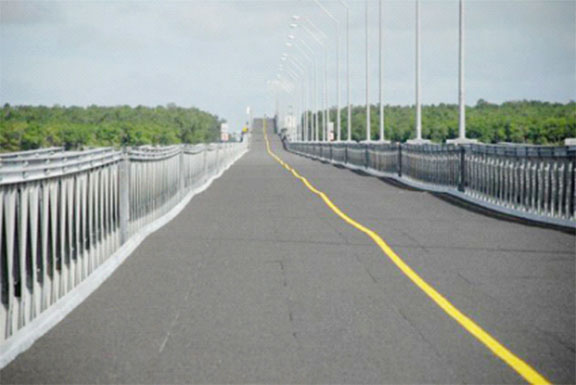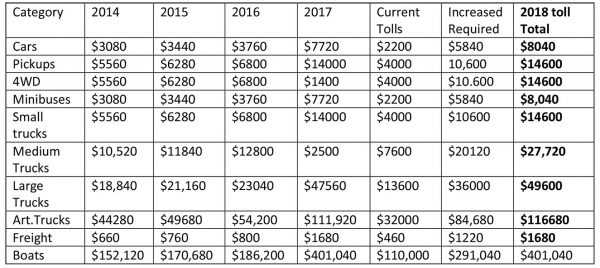Proposing hefty increases to current tolls in keeping with its contract with government, the Berbice Bridge Company Inc (BBCI) yesterday warned that the current APNU+AFC administration’s continued refusal of the hikes could lead to the company’s bankruptcy.
“The investors, who are almost every Guyanese through investments by the NIS [National Insurance Scheme], etcetera, are facing the distinct possibility that the company can go bankrupt,” Chairman of BBCI Surendra Persaud yesterday told a press conference that the company held at the National Communications Network (NCN) in Georgetown.

Persaud, who is also the Chairman of the NIS, said that while government had sent it no formal denial of the increases, Minister of Public Infrastructure David Patterson told him that Cabinet did not approve the company’s proposal and that it must exhaust all avenues to make the fees feasible for commuters.
According to the contract signed with the then People’s Progressive Party/Civic (PPP/C) government in 2006, the implementation of the increases agreed would see cars and minibuses paying $8,040 this year, while pickups, four-wheel drive vehicles and small trucks would pay $14,800.
The table below shows the toll adjustment as per formula which Persaud said should have been implemented incrementally from 2014 and would not have been so burdensome:
Following BBCI’s press conference, government swiftly responded, assuring the populace, and particularly Berbicians, that it was not contemplating any increases and stood by its decision.
“The Ministry of Public Infrastructure notes comments by the Berbice Bridge Company officials at a press conference today, Tuesday, July 10, and wishes to assure all Berbicians and users of the Berbice Bridge that government is not contemplating any increases to the Berbice Bridge toll,” a statement from the Ministry of Public Infrastructure said.
“Government stands by its decision to reduce tolls in fulfilling a campaign commitment, and will continue to work with the Berbice Bridge Company in ensuring that the Bridge is sufficiently maintained and safe for vehicular and marine use,” it added.
But Persaud said that under the contractual agreement with the then PPP/C government for the bridge’s construction in 2006, both parties agreed to a staggered increase over the years that would have seen it generating a profit and paying shareholder dividends.
Analysts had warned years ago that this public-private deal under the PPP/C with an estimated 23% return on investment was not feasible and would eventually lead to the bankruptcy of the company.
Concession Agreement
Persaud said when investors established the BBCI and entered into a Concession Agreement under the Berbice River Bridge Act of 2006, the contract spelled out that they would own and operate the bridge for a period of 21 years, after which a fully operational bridge would be transferred to the government and people of Guyana, at no cost.
When asked if the company had considered the social implications the high tolls would have on commuters, he said those implications are for governments to take into consideration since the BBCI was a business and was focused on the contractual agreements.
He noted that since the completion of the crossing in 2008, there have been no increases. “As per the contract that exists between the company and the Government of Guyana, a formula is used to determine what the toll of the bridge needs to be to ensure that the company can operate and maintain the bridge and meet its obligations to its investors. This formula is a contained in a fourteen (14) pages document, addendum to the Concession Agreement, called the Tolling Policy,’ which is the sole authority on the determination of tolls. The toll adjustment is an essential requirement to ensure that the bridge company can continue to execute its mandate, including meeting its’ obligations to its finances,” the Chairman said.
With three applications made—one to the PPP/C in March, 2015 and two to the APNU+AFC in August, 2015 and January, 2016—and three rejections, Persaud said the future looks dismal for the company and its investors.
He asserted that the current “crisis” the company faces is man-made since government continues to default on the concession agreement.
“The bridge faces a crisis. Sadly, this crisis is manmade; that is, not due to a natural disaster such as a tsunami or a hurricane,” Persaud said.
He said that government’s position has the potential to scare off future investors when it is already seeking companies for projects such as the New Demerara River Crossing.
To build major infrastructure like the bridge, Persaud noted, required a lot of money, which the then government did not have. He said this was the reason why they entered into what are called Public Private Partnerships (PPPs) but added that it doesn’t bode well for investors if contracts are not upheld. “We are in a situation where the contractual obligations of a public private partnership have not been met on the government’s part, and, if not corrected, is likely affect the willingness of the private sector to partner with the government in future infrastructure projects like, for instance, the New Demerara River Bridge and the recently announced Power Plant to utilize some of the gas found offshore,” he said.
Fixable
“The board believes that this situation is fixable. There is a contract, there is an established formula within that contract and there are obligations to be met. History will judge us very harshly should we fail to deliver on this promise,” he added.
Without the needed revenue from the tolls, at their determined rates, Persaud said BBCI has been unable to carry out needed maintenance work on the bridge. “These accumulated losses and shortfall of cash flow have compromised the bridge company’s obligation to efficiently operate and maintain the bridge, including the timely servicing of its 39 pontoons under the bridge, and have resulted in the company defaulting on its obligations to its investors. So, let us remember who the investors are, almost every Guyanese, through entities like the NIS, various pension funds, insurance companies and commercial financial institutions,” he said.
The NIS has complained in the past that the bridge company has not been paying dividends.
Persaud called again on government to intervene, saying that the situation cannot be allowed to continue “since we will all suffer”.
Government’s response reminded that the agreement places obligations on both sides, including scheduled maintenance by BBCI.
“Any request for toll increases must take into consideration a wide array of factors and cannot solely be on the basis of recouping operational costs and profits on dividend,” government said.
“The Berbice Bridge provides a critical service to the public and tolls must remain reasonable and cannot be arbitrarily hiked to oppressive and onerous levels. Government will continue to take practical decisions in the interest of the people of Guyana and the provision of quality services,” it added.
The NIS owns 76% of the total shareholding of the BBCI. During the Jagdeo administration, decisions were made to have the Scheme invest heavily in the bridge. This investment had been questioned over the years.
Demerara Distillers Limited sold its 10% of shares in the bridge company in 2016 to the government for just over $40m. Queens Atlantic Investment Inc and Secure International Finance Company Limited are among other investors.











